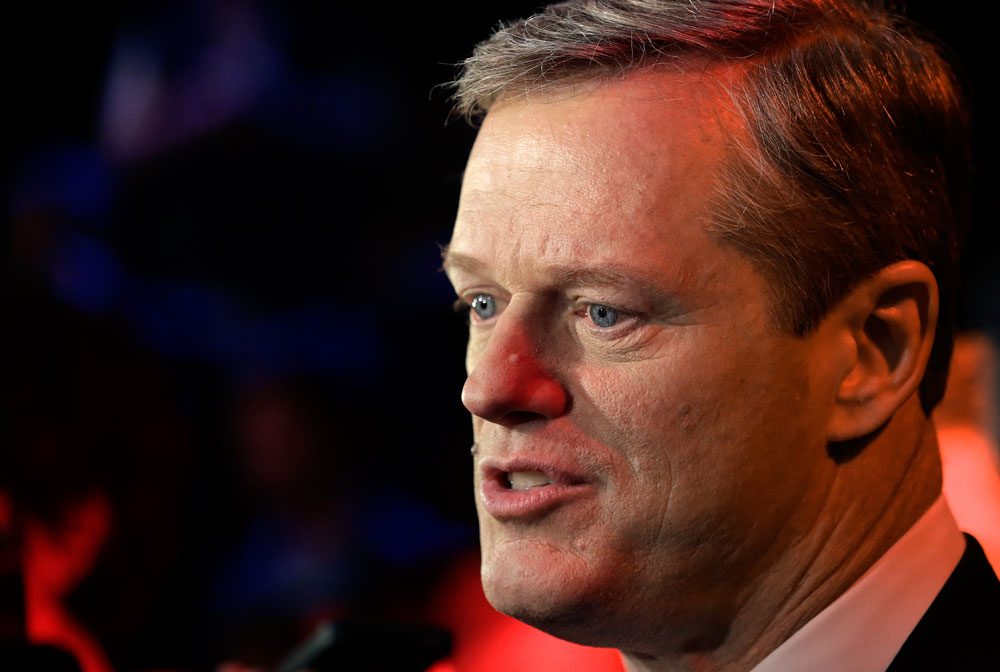Advertisement
Commentary: Baker Wins Debate By 'Losing It'

Tuesday night’s gubernatorial debate was important because it was the final one and had the largest broadcast audience.
Charlie Baker won the debate by losing it — losing his composure, that is. He cried in recalling an encounter he had with a fisherman who felt he had let down his sons.
The question that was posed to both candidates was: “When was the last time you cried?” That question might have prompted some voters to cry, thinking this is what debates had devolved into, an attempt to create “reality TV” by probing the personal side of candidates. Baker warned viewers that he “might not make it through this story,” and almost didn't.
It seemed genuine. Some undecided voters must have felt moved by his emotion — not out of sympathy, but because it seemed to reveal that this man, known as a bureaucrat or capitalist, could be so caring about people in need.
Those who don't trust Baker, or any politician, might suspect it was a conscious appeal to emotion. But I don’t think many TV viewers would have felt it wasn't heartfelt.
Maybe some Coakley supporters will feel it’s a double-standard — arguing that if Coakley had become so emotional her critics would say she wasn’t strong enough to be governor. But when Hillary Clinton got misty-eyed during the Democratic primary in New Hampshire, her support rose because it was said to have “humanized” her. Baker came across as equally human — and one assumes that most voters like the idea of having a human as governor.
Twenty years ago, Dr. John Silber, Democratic nominee for governor against Baker’s old boss and mentor, Bill Weld, was thought to have lost the race because of a bad “moment” on TV. He lashed out at the TV journalist interviewing him, the popular anchor Natalie Jacobson, and that flash of anger revealed a man who had a temperament issue. Was Baker’s moment of sadness equally momentous? Judging from the TV coverage, perhaps. Replay of his answer is probably the longest “sound-and-silence bite” for a political candidate in decades.
Coakley supporters may think Baker unfairly “stole the debate” with his passionate response. Regardless, his crying will be the only thing remembered — and debated — about this final debate.
Actually it seemed like two debates. The first half was a rehash of complaints, accusations and claims. If voters hadn't watched earlier debates or followed the news, they might have found it enlightening – in that they’d learn why the two candidates have been so low in polls. They were not winning personalities. But in the last half, they opened up and were much more appealing.
Baker was surprising — he didn't just cry; he was choked up and couldn't speak for a while. Many voters love that; they love when politicians can’t speak. The dramatic silence was effective on TV, but not so compelling on radio.
Baker’s passion came at a great time for his campaign, however accidental. Baker had some momentum going into the debate, with newspaper endorsements, poll numbers and an ad blitz. He might have peaked in this debate.
Baker can sound like he relies on too much policy jargon. He’ll use phrases like a “virtuous circle” about manufacturing, or a “runway for kids” about jobs. But he sounded compassionate talking about the fisherman. He also sounds better when he’s being humorous or talking about culture. When the candidates were asked which late night talk show they preferred, Coakley was succinct, picking Jimmy Fallon. Baker agreed, but elaborated, saying Fallon was “wicked funny” and multi-talented, which showed he wasn't just answering a question like a politician. He was a real fan.
Coakley said three times, “I will stand on my record.” Well, she’s not running for reelection as attorney general. Another time she sounded like Richard Nixon when she was defensive about not prosecuting former House Speaker Sal DiMasi — “Let me say this about that.” And she still can’t speak about job-creation in a way state Treasurer Steve Grossman, her Democratic primary opponent, urged her to do. She said the usual, “We must invest in our workforce,” but people know she’s talking about more government spending, not directly spurring job-creation in the private sector.
On other issues, Coakley suffered on taxes. She retreated from earlier interest in a graduated income tax. And after Baker stated he would not raise fees, she said, "Well, if you say you won't raise fees, then I'm not going to raise fees, either." After the debate she said she had been joking, but viewers didn't get the joke.
Baker was on the defensive on the pay-to-play controversy in New Jersey, and didn't have a good answer for why he wouldn't release his employee contract or call on New Jersey officials to release their investigative report before the election, to clear him of suspicion. But time is running out on the Coakley campaign being able to explain and advertise that issue to voters.
Both candidates have seemed two-dimensional in past debates, and even in their own TV spots. In the last half of this debate they came across as not just qualified — we knew that already — but as individuals who deserved to be considered for governor. Boston Globe columnist Yvonne Abraham wrote this on Sunday: “Whatever happens, those candidates deserve immense credit for how hard they've worked, and how far they've come.” This debate revealed that.
Both candidates have been less inspiring than past candidates for governor or senator, but both have grown in the course of this campaign. And both have thousands of supporters working hard for them in the final week of this long campaign. Unfortunately for those who signed up to do weekend canvassing, the weather is supposed to be cold and rainy. Baker probably doesn't mind. He’s got to be feeling his prospects are quite sunny.
Todd Domke is a Republican political analyst for WBUR.
